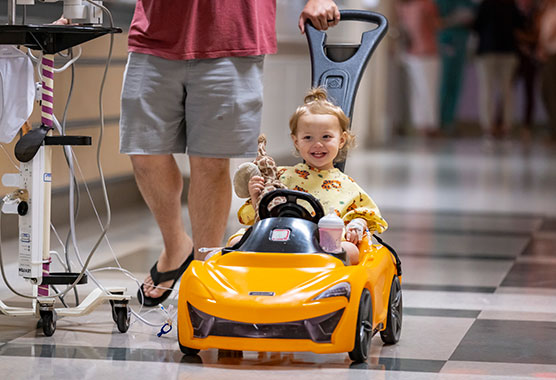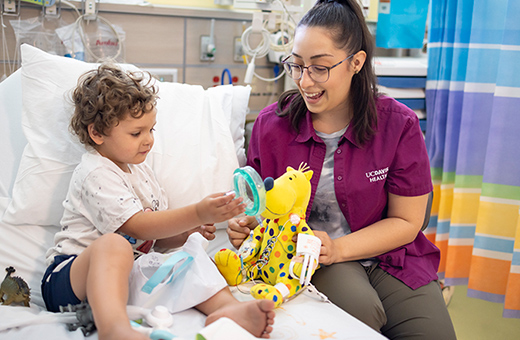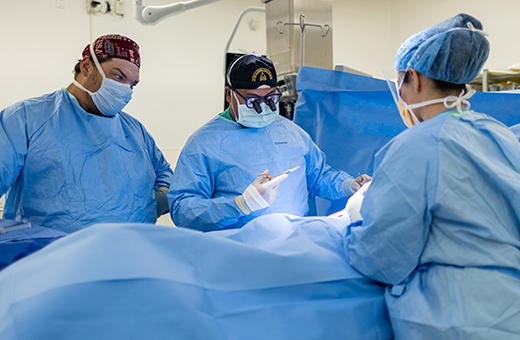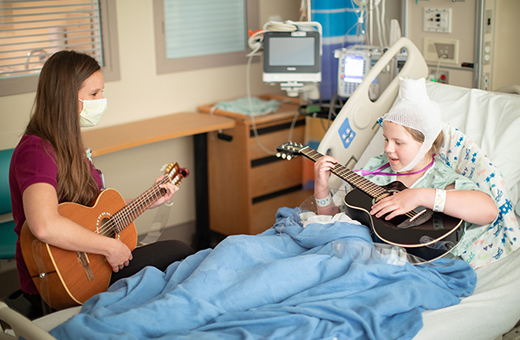Pediatric Surgery
Our expert surgical team uses advanced surgical techniques to treat all types of medical conditions in infants, children and adolescents.
Medically reviewed on June 05, 2023.

Highest Level of Pediatric Surgery Care
At UC Davis Children’s Surgery Center, we offer expert surgical care for your child. We have the first level 1 Children’s Surgery Center on the West Coast. This means no matter how minor or complex your child’s condition, our highly skilled pediatric surgeons can help.
Our children’s operating rooms are available to patients 24 hours a day. We also offer dedicated board-certified pediatric anesthesiologists who care for your child before, during and after surgery.
Types of Pediatric Surgery
At UC Davis Children’s Surgery Center, we treat many pediatric conditions and injuries. We create customized treatment plans for every child, using both minimally invasive and traditional surgical techniques.
Fetal Surgery
We offer fetal surgery to correct or minimize a variety of life-threatening or potentially disabling conditions, such as spina bifida. Our surgeons focus on protecting the health of both the child and the mother.
Neonatal Surgery
We perform surgery on newborn babies who are critically ill or premature. Our surgeons treat abnormalities either present at birth (congenital) or acquired. We use minimally invasive surgery when possible.
Pediatric General Surgery
We offer pediatric general surgery for health concerns such as appendix removal (appendectomy), soft tissue bulging through abdominal muscles (inguinal hernias) and circumcision. We use minimally invasive procedures for these surgeries when possible.
Pediatric Surgical Oncology
Our pediatric surgical oncology team provides diagnostic and surgical treatments to children with cancer. We focus on all types of pediatric cancer, including liver tumors (hepatic tumors) and kidney cancer (Wilms tumor).
Pediatric Thoracic Surgery
We offer surgery for pediatric conditions or injuries that affect your child’s thoracic cavity. This is the area between your child’s neck and abdomen, such as their lungs or esophagus. Depending on the thoracic surgery procedure, we use minimally invasive techniques when possible.
Pediatric Vascular Anomalies
We treat congenital conditions caused by the abnormal development of blood vessels. These conditions may include benign tumors (hemangiomas) or more severe abnormalities in the arteries or veins (vascular malformations).
Request an Appointment
As Sacramento's No. 1 hospital, you'll benefit from unique advantages in primary care and specialty care. This includes prevention, diagnosis and treatment options from experts in 150 specialties.
Referring Physicians
To refer a patient, submit an electronic referral form or call.
800-4-UCDAVIS
Patients
Call to make an appointment.
Consumer Resource Center
800-2-UCDAVIS
Before surgery, we’ll talk to you and your child about what to expect. Following their physician’s instructions before, during and after surgery helps ensure a safe and successful outcome.
-

Before Pediatric Surgery
Before surgery, our child life specialists are available to help children understand and cope with their surgery. On the day of surgery, your child should have an empty stomach. Depending on the type of surgery, we will let you know when they should stop eating and drinking. Your child should also dress in comfortable clothes. They can bring a favorite object, such as a stuffed animal or a book.
-

During Pediatric Surgery
We discuss ahead of time what you and your child can expect during their surgery, based on their specific condition and type of surgery. While some procedures may allow you to remain in the room with your child, others will need you to stay outside in the waiting area. Rest assured, our compassionate team will look after your child throughout their procedure.
-

After Pediatric Surgery
After surgery, your child will rest in a recovery room. If your child has anesthesia, they will stay there until they feel well enough to go home. If your child needs to stay in the hospital longer, we encourage a parent or guardian to stay in the room with them overnight. We give you detailed recovery instructions and any support your child needs.
Home Care After Your Child’s Surgery
After your child returns home from surgery, they will need some special care and attention. Your child’s recovery time will depend on the type of surgery, their condition and the kind of anesthesia used.
Monitor Their Activities
Let your child relax the rest of the day. Try activities like reading or watching TV. They may feel unsteady, so you should keep a close eye on them.
Start with Clear Liquids
If your child feels unwell or doesn’t have an appetite, begin with clear liquids, such as water or ginger ale. They can progress to light foods like crackers or soup when they start feeling better.
Keep Pain Under Control
Your child may have pain or a low-grade fever (under 101 degrees Fahrenheit). Your surgeon or physician will give you advice on treating your child’s pain. You can also offer them cold liquids or popsicles.
When to Contact Your Physician
Contact your child’s physician right away if you notice any signs of infection or symptoms including:
- Excessive bleeding, drainage, odor, redness or swelling at the surgery site
- Extreme difficulty waking up
- Fever higher than 101 degrees Fahrenheit (38.3 degrees Celsius)
- No urination 6 to 8 hours after coming home
- Severe pain
- Severe vomiting or nausea

Ranked among the nation’s best hospitals
A U.S. News & World Report best hospital in cardiology, heart & vascular surgery, diabetes & endocrinology, ENT, geriatrics, neurology & neurosurgery, and pulmonology & lung surgery.

Ranked among the nation’s best children’s hospitals
U.S. News & World Report ranked UC Davis Children’s Hospital among the best in pediatric nephrology, orthopedics*, and pulmonology & lung surgery. (*Together with Shriners Children’s Northern California)

Ranked Sacramento’s #1 hospital
Ranked Sacramento’s #1 hospital by U.S. News, and high-performing in aortic valve surgery, back surgery (spinal fusion), COPD, colon cancer surgery, diabetes, gynecological cancer surgery, heart arrhythmia, heart failure, kidney failure, leukemia, lymphoma & myeloma, lung cancer surgery, pacemaker implantation, pneumonia, prostate cancer surgery, stroke, TAVR, cancer, orthopedics, gastroenterology & GI surgery, and urology.

The nation’s highest nursing honor
UC Davis Medical Center has received Magnet® recognition, the nation’s highest honor for nursing excellence.

World-class cancer care
One of ~59 U.S. cancer centers designated “comprehensive” by the National Cancer Institute.

A leader in health care equality
For the 13th consecutive year, UC Davis Medical Center has been recognized as an LGBTQ+ Healthcare Equality Leader by the educational arm of America’s largest civil rights organization.

